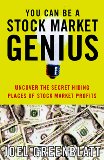Often it is only in retrospect when it becomes possible to identify cases in which one has inadvertently followed herd like behavior rather than profiting from it. In such cases, rather than kicking yourself at the time mistakes were made, you can proceed to do so years after the mistake was made. I was kicking myself recently for making a mistake in 2004 that I previously recognized as a financial mistake but now realize that it was motivated by herd like behavior which I consider to be a sin much larger than a mere financial loss.
While reading Joel Greenblatt’s book, You Can Be a Stock Market Genius, it occurred to me that I exhibited the exact behavior that he predicted when I almost immediately sold the shares in Hospira that I received from Abbott Laboratories’ spin off of the subsidiary in 2004. Since I had purchased shares of Abbott based on the overall characteristics of the parent company rather than the attributes of any one unit, I viewed the relatively small position I received in Hospira as a distraction that was not worth the time required to own (in terms of keeping up with corporate developments, reading reports, etc).
Hospira proceeded to nearly double over the next eighteen months, following a predictable decline immediately after the spin off caused by people like me who felt a need to sell. Perhaps the fact that the net proceeds of the sale amounted to $666 should have provided a clue that something was terribly amiss in my decision making process?
Excuses, Excuses …
Sure, I can make the excuse that I did not have time to research Hospira because I happened to be a part time “evening and weekend” investor at the time, but there was no excuse to not carefully examine the spin off situation and determine the underlying economics and psychology that may cause pricing inefficiencies to emerge. Indeed, spin offs are covered in quite a bit of detail in Mr. Greenblatt’s book where he makes the point that selling pressure often afflicts the spun off shares in the short run because the recipients are not interested in holding small positions in a company that did not drive their original decision to invest in the parent. Furthermore, many professional investors are forced to liquidate such positions because they may not meet market capitalization requirements or adhere to the style of the manager’s fund.
Clearly, I should have more closely examined the filings related to the spin off and considered the merits of buying more Hospira rather than selling my relatively small stake. Simply because the spin off accounted for only a tiny position did not preclude me from considering the merits of the company and taking a full position.
Can Individual Investors Really Participate?
Many individual investors, even those who consider themselves to be “enterprising investors”, often question whether they have any real edge over professionals managing billions of dollars. In fact, Mr. Greenblatt argues that individual investors have significant and enduring advantages due to managing smaller portfolios, not being limited by restrictions such as the mandate of a fund, and being able to pick and choose from opportunities that may have passed under the radar of the larger players.
The book also provides guidance on what areas to avoid. Mr. Greenblatt makes a good case for avoiding risk arbitrage scenarios but identifies other interesting ways to profit from mergers and acquisitions. Bankruptcies and recapitalization opportunities also receive quite a bit of space in the book.
Although some of the examples and advice related to information sources are outdated given that this book was published in 1997, the concepts that are covered should be applicable in today’s market because the basic forces at play remain intact. Mr. Greenblatt also delivers all of this information in a humorous style that is both quick to read and entertaining.
While the majority of individual investors are probably not suited to participate in special situations, this book can provide important guidance for those who are. Based on the battered condition of the book that I borrowed from my local library and the dozens of due dates listed, it is apparent that I am not alone in benefitting from this advice, albeit twelve years after I should have taken the time to read the book!
Disclosure: The author does not currently own shares in Abbott or Hospira.

